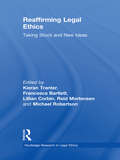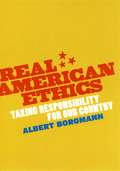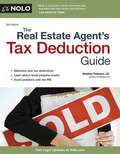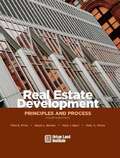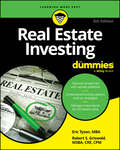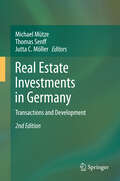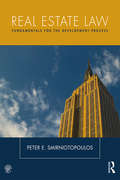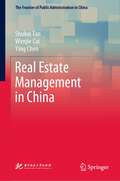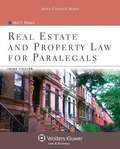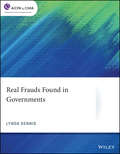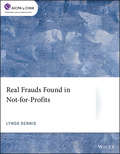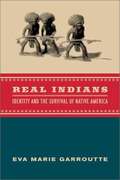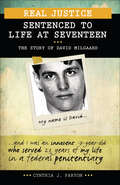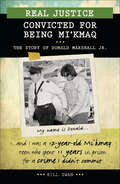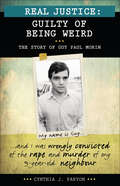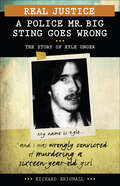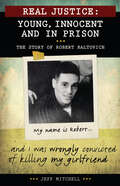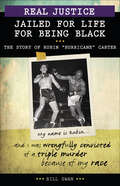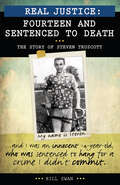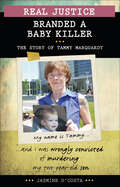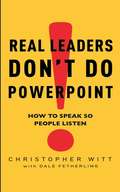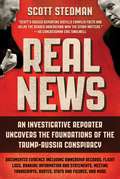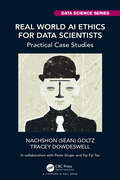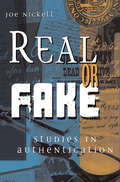- Table View
- List View
Reaffirming Legal Ethics: Taking Stock and New Ideas (Routledge Research in Legal Ethics)
by Kieran TranterIt has been over thirty years since the founding crises that birthed legal ethics as both a field of study and a discrete field of law. In that time thinking about the ethical dimension of legal practice has taken several turns: from justifications of zealous advocacy, to questions of process and connections to specifically legal values, to more recently consideration of legal conduct as part of a wider field of virtue. Parallel to this dynamism of thought, there has also been significant changes in how legal professions, especially within those that possess a common law heritage, have been regulated and the values and conceptions of legitimate conduct that has informed this regulation. This volume represents an opportunity for a comprehensive review of legal ethics as an international movement. Contributors include many of the key participants to the legal ethics field from the United States, United Kingdom, Canada, Australia, New Zealand and South Africa, including David Luban and Deborah Rhode, as well as many of the recognised emerging thinkers. The theme of the book is taking stock of the last thirty years of legal ethics practice and scholarship and also a forum for new ideas and new thinking regarding the conduct of lawyers and the moral and social responsibility of the legal profession. The contributions also consider the topic of dynamism. Over the last decade significant developments in both the expectations of professional conduct and the regulation of the profession has been experienced in all jurisdictions, which has seen traditional, and once sacred, conceptions of lawyering challenged and re-evaluated. The contributors also look at the theme of affirmation. Within an increasingly complex environment of change and dynamism, this volume reaffirms that there is value within the field of legal ethics. That is the project of reflecting on the unique ethical and conduct requirements of lawyering can not be submerged into a broader field of applied philosophy, management or regulatory studies. While this volume does not deny the opportunities that exist for interdisciplinary engagement with philosophy, social science or politics, it affirms legal ethics as a legitimate and highly relevant field of inquiry.
Real American Ethics: Taking Responsibility for Our Country
by Albert BorgmannAmerica is a wonderful and magnificent country that affords its citizens the broadest freedoms and the greatest prosperity in the world. But it also has its share of warts. It is embroiled in a war that many of its citizens consider unjust and even illegal. It continues to ravage the natural environment and ignore poverty both at home and abroad, and its culture is increasingly driven by materialism and consumerism. But America, for better or for worse, is still a nation that we have built. So why then, asks Albert Borgmann in this most timely and urgent work, are we failing to take responsibility for it? In Real American Ethics, Borgmann asks us to reevaluate our role in the making of American values. Taking his cue from Winston Churchill—who once observed that we shape our buildings, and then our buildings shape us—Borgmann considers the power of our most enduring institutions and the condition of our present moral makeup to propose inspired new ways in which we, as ordinary citizens, can act to improve our country. This, he shows, includes everything from where we choose to live and what we spend our money on to daunting tasks like the reshaping of our cities—habits and actions that can guide us to more accomplished and virtuous lives. Using prose that is easy and direct throughout, Borgmann’s position is grounded neither by conservative nor liberal ideology, but in his understanding that he is a devoted citizen among many. In an age in which the blame game is the only game in town, this patriotic book is an eloquent reminder of the political strength we all wield when we work together.
Real American Ethics: Taking Responsibility for Our Country
by Albert BorgmannAmerica is a wonderful and magnificent country that affords its citizens the broadest freedoms and the greatest prosperity in the world. But it also has its share of warts. It is embroiled in a war that many of its citizens consider unjust and even illegal. It continues to ravage the natural environment and ignore poverty both at home and abroad, and its culture is increasingly driven by materialism and consumerism. But America, for better or for worse, is still a nation that we have built. So why then, asks Albert Borgmann in this most timely and urgent work, are we failing to take responsibility for it? In Real American Ethics, Borgmann asks us to reevaluate our role in the making of American values. Taking his cue from Winston Churchill—who once observed that we shape our buildings, and then our buildings shape us—Borgmann considers the power of our most enduring institutions and the condition of our present moral makeup to propose inspired new ways in which we, as ordinary citizens, can act to improve our country. This, he shows, includes everything from where we choose to live and what we spend our money on to daunting tasks like the reshaping of our cities—habits and actions that can guide us to more accomplished and virtuous lives. Using prose that is easy and direct throughout, Borgmann’s position is grounded neither by conservative nor liberal ideology, but in his understanding that he is a devoted citizen among many. In an age in which the blame game is the only game in town, this patriotic book is an eloquent reminder of the political strength we all wield when we work together.
Real Estate Agent's Tax Deduction Guide, The
by Stephen FishmanThe real estate agent's essential guide to tax deductions Understanding tax deductions can be the difference between having a successful year--or not--for real estate agents and brokers. By taking advantage of the many tax deductions available to them, real estate professionals can end each year with more money in their pockets and less owed to the IRS. Too often, these valuable deductions are overlooked, even though it's easy to take advantage of them once you understand the rules. This book explains all you need to know in plain English with lots of examples and practical information. Learn about the most important deductions and how to plan and track your expenses all year so you avoid problems with the IRS. The information is organized into categories that explain the rules for each type of deduction, including: -start-up expenses -operating expenses -home and outside office -health care -vehicles and travel -entertainment and meals -and many more It also explains essentials like depreciation deductions, deducting losses, and keeping proper records.
Real Estate Development: Principles and Process
by Mike E. Miles Marc A. Weiss Gayle L. Berens Mark J. EppliIdeal for anyone new to real estate development, the fourth edition of this bestselling book covers each stage of the process step by step, explaining the basics of idea conception, feasibility, planning, financing, market analysis, contract negotiation, construction, marketing, and asset management. Thoroughly updated, the book includes material on financing and marketing.
Real Estate Investing For Dummies
by Eric Tyson Robert S GriswoldMake smart decisions in any real estate market Real estate is always on the radar of investors looking for growth opportunities. Real Estate Investing For Dummies is your no-nonsense guide to adding real estate to your own portfolio. Considered one of the most desirable investment types, real estate is a great way to build wealth—if you know how to navigate the challenges. This book teaches you how to enhance your income by buying investment properties. It includes help with building a plan for raising capital, finding properties with promise, and becoming a successful property manager. With tips on increasing property value and creating a real estate portfolio that matches your goals, this guide is a must for any would-be real-estate investor. Understand the different types of real estate investment and build a team that will help you succeed Finance your investments and locate properties that generate income Learn how to research real estate investment opportunities and sell at the right time Increase the value of your assets and become a property manager This book is designed for real estate investing beginners who are eager to purchase property for the purpose of building wealth. Experienced investors will also love the portfolio-enhancing advice inside.
Real Estate Investments in Germany
by Jutta C. Möller Michael Mütze Thomas SenffThe real estate market in Germany has recovered remarkably well from 2008/09 crisis. Portfolio transactions, infrastructure projects as well as investments in commercial and residential real estate are on the rise. This publication provides investors, property developers and advisers with a practical guideline to the legal, tax and commercial framework for real estate investments in Germany.
Real Estate Law: Fundamentals for The Development Process
by Peter E. SmirniotopoulosUnlike existing textbooks written for law students on specific subjects impacting real estate transactions, Real Estate Law: Fundamentals for The Development Process uses "The Development Process" as a framework for understanding how the U.S. legal system regulates, facilitates, and generally impacts real estate transactions and their outcomes. This book not only addresses the nature of specific legal issues directly relating to real estate transactions but also how those issues may best be identified and addressed in advance. This book breaks down the myriad of laws influencing the selection, acquisition, development, financing, ownership, and management of real estate, and presents them in context. Readers of Real Estate Law will gain a practical understanding, from the perspective of a real property developer or real estate executive, investor, or lender, of: how to identify potential legal issues before they arise; when to involve a real estate attorney; how to select an attorney with the appropriate, relevant experience; and how to efficiently and economically engage and manage legal counsel in addressing real estate issues. Written as a graduate-level text book, Real Estate Law comes with numerous useful features including a glossary of terms, chapter summaries, discussion questions, further reading, and a companion website with instructor resources. It is a resource of great value to real estate and finance professionals, both with and without law degrees, engaged in one aspect or another of real estate development and finance, who want to become more conversant in the legal issues impacting these transactions.
Real Estate Management in China (The Frontier of Public Administration in China)
by Ying Chen Shukui Tan Wenjie CaiThis book reflects the great changes in terms of real estate sales, purchases, finance and policies from planned economy to market economy in China. Real estate system has always been a great concern to the public for its irreplaceable role in people’s lives and various daily affairs, as well as in the development of the whole economy, especially in China’s context. The unique perspective of this book lies in the significant role that the Chinese government plays in real estate system. This book aims to help readers to understand China’s real estate system comprehensively.
Real Estate and Property Law for Paralegals
by Neal R. Bevans BevansReal Estate and Property Law for Paralegals provides a solid foundation in the basics including the practicalities of daily legal work. Its broad coverage of all the key topics that paralegals need to know includes basic elements of real property, different methods used to record and describe property, transfer of title, the rights associated with real estate ownership,elements of real estate contracts, landlord/tenant law, deeds, mortgages,restrictions on land use, title insurance and title examinations, the closing process, and tax implications. Practical skills are emphasized throughout the book so that students will develop a true understanding of what it is like to practice in the real world. An easy-to-read and engaging style utilizes numerous examples and illustrations, always emphasizing the practical nature of real estate law. Each chapter opens with objectives and closes with Key Terms, Review Questions, and Practical Applications exercises. In every chapter, an "Issue at a Glance" box summarizes important legal concepts, and"Skills You Need in the Real World" sections highlight particular paralegal skills. Marginal definitions; numerous figures, tables, and forms; and case excerpts that discuss legal theory and applications round out the significant pedagogy. Additionally, Websites that can help students gather more information are strategically placed. An in-depth Instructor's Manual includes a test bank, lesson plans, suggested syllabi, web resources, additional assignments and PowerPoint slides for each chapter. The revised Third Edition provides a wealth of updated forms and cases. New website references make the book current, and fine-tuned text discussions have been expanded where appropriate. A new interactive workbook is available at the website to accompany the book.
Real Frauds Found in Governments (AICPA)
by Lynda DennisFrauds in governments are as unique as government entities themselves. In this book, you will learn about real-world government fraud, including cyber fraud, and your responsibilities when dealing with government. Analyzing several unique frauds that occurred in the sector, this book offers a comprehensive learning approach using examples, explanations of audit standards, and informative case studies. Key topics include: misappropriation of assets, external financial reporting, cyber fraud, management override, and improper use of procurement cards.
Real Frauds Found in Not-for-Profits (AICPA)
by Lynda DennisDue to the nature of not-for-profits, fraud may be more common than it seems. This book shows how to recognize red flags of fraud, including cyber fraud. It offers a comprehensive learning approach using real-world examples, explanations of audit standards, and informative case studies that analyze several unique frauds which occurred in the not-for-profit industry. Key topics covered are: misappropriation of benefits, pledges and contributions, cyber fraud, and grant expense allocations.
Real Indians: Identity and the Survival of Native America
by Eva Marie GarroutteAn insightful and original analysis of the competing ways that Indian identity is defined, followed by a discussion of a new way of defining Indian-ness, which the author calls "indigenous theory."
Real Justice: The Story of David Milgaard (Lorimer Real Justice)
by Cynthia J. FaryonDavid Milgaard was a troubled kid, and he got into lots of trouble. Unfortunately, that made it easy for the Saskatoon police to brand him as a murderer. At seventeen, David Milgaard was arrested, jailed, and convicted for the rape and murder of a young nursing assistant, Gail Miller. He was sent to adult prison for life. Throughout his twenty-three years in prison, David maintained that he was innocent and refused to admit to the crime, even though it meant he was never granted parole. Finally, through the incredible determination of his mother and new lawyers who believed in him, David was released and proven not guilty. Astonishingly, in hindsight the real murderer was obvious from the start. This is the true story of how bad decisions, tunnel vision, poor representation, and outright lying and coercion by those within the justice system caused a tragic miscarriage of justice. It also shows that wrongs can be righted and amends made. Distributed in the U.S by Lerner Publishing Group
Real Justice: The Story of Donald Marshall Jr. (Lorimer Real Justice)
by Bill SwanWhen a black teen was murdered in a Sydney, Cape Breton park late one night, his young companion, Donald Marshall Jr., became a prime suspect. Sydney police coached two teens to testify against Donald which helped convict him of a murder he did not commit. He spent 11 years in prison until he finally got a lucky break. Not only was he eventually acquitted of the crime, but a royal commission inquiry into his wrongful conviction found that a non-aboriginal youth would not have been convicted in the first place. Donald became a First Nations activist and later won a landmark court case in favor of native fishing rights. He was often referred to as the "reluctant hero" of the Mi'kmaq community. Distributed in the U.S by Lerner Publishing Group
Real Justice: The Story of Guy Paul Morin (Lorimer Real Justice)
by Cynthia J. FaryonAt twenty-four, Guy Paul Morin was considered a bit strange. He still lived at home, drove his parents' car, kept bees in the backyard, and grew flowers to encourage the hives. He played the saxophone and clarinet in three bands and loved the swing music of the 1940s. In the small Ontario town where he lived, this meant Guy Paul stood out. So when the nine-year-old girl next door went missing, the police were convinced that Morin was responsible for the little girl’s murder. Over the course of eight years, police manipulated witnesses and tampered with evidence to target and convict an innocent man. It took ten years and the just-developed science of DNA testing to finally clear his name. This book tells his story, showing how the justice system not only failed to help an innocent young man, but conspired to convict him. It also shows how a determined group of people dug up the evidence and forced the judicial system to give him the justice he deserved. Distributed in the U.S by Lerner Publishing Group
Real Justice: The Story of Kyle Unger (Lorimer Real Justice)
by Richard BrignallOn the night of June 23, 1990, teenage friends Kyle Unger and John Beckett made a last-minute decision to attend a music festival near Roseisle, Manitoba. They were loners, not the popular kids at school. But on this night they seemed to finally fit in. They had fun, played games, drank, and hung around bonfires with other people. The next morning, a sixteen-year-old girl was dead. By the next week, Kyle was charged with her murder. Due to insufficient evidence he was let go, but the Mounties were convinced he was the killer. They laid a trap, called the Mr. Big operation, for Kyle. With offers of money, friends, and a new criminal lifestyle, the RCMP got Kyle to confess to the murder. But the confession was false—he had not been the killer. He was convicted and sent to prison. For the next twenty years Kyle fought for his freedom. He was finally acquitted in 2009. This book tells the story of an impressionable but innocent teenager who was wrongfully convicted based on the controversial Mr. Big police tactic. Distributed in the U.S by Lerner Publishing Group
Real Justice: The Story of Robert Baltovich (Lorimer Real Justice)
by Jeff MitchellAt twenty-five, Rob Baltovich lost the love of his life, Elizabeth Bain. That was bad enough. Then he was arrested, jailed, sent to trial for murder, convicted, and sent to prison—for life. Throughout his years in prison, Rob maintained that he was innocent, refusing to admit to a crime he didn't commit. The result was he was never granted parole. Finally, his luck began to turn when he hired new lawyers who believed in him. Not only did they get Rob acquitted, they also made a strong case that the real murderer was the infamous serial killer Paul Bernardo. Author Jeff Mitchell tells much of the story in Baltovich's own words. In this book, young readers will discover how this tragic miscarriage of justice happened—and how the legal system can right its own wrongs when lawyers and judges are willing to re-examine a case with fresh eyes. Distributed in the U.S by Lerner Publishing Group
Real Justice: The Story of Rubin "Hurricane" Carter (Lorimer Real Justice)
by Bill SwanRubin Carter was in and out of reformatories and prisons from the age of twelve. At twenty-four, he became a winning professional boxer and was turning his life around. But Carter was also very vocal about racism in the local New Jersey police force. In 1966, local policemen arrested Carter and a friend for a triple murder. The two were convicted and sent to jail for life. Carter spent nearly twenty years in jail, proclaiming his innocence. A teen from Brooklyn, Lesra Martin, heard Carter's story and believed he was innocent. He and a small group of Canadians contacted Carter and began working with Carter's lawyers in New York to get the boxer exonerated. In 1985, a judge released Carter, ruling that Carter's conviction had been based not on evidence, but on racism. Carter moved to Canada in 1985, where until his death in 2014 he worked helping others prove that they had been wrongfully convicted. Distributed in the U.S by Lerner Publishing Group
Real Justice: The Story of Steven Truscott (Lorimer Real Justice)
by Bill SwanAt fourteen, Steve Truscott was a typical teenager in rural Ontario in the fifties, mainly concerned about going fishing, playing football, and racing bikes with his friends. One summer evening, his twelve-year-old classmate, Lynne Harper, asked for a lift to the nearby highway on his bicycle and Steve agreed. Unfortunately, that made Steve the last person known to see Lynne alive. His world collapsed around him when he was arrested and then convicted of killing Lynne Harper. The penalty at the time was death by hanging. Although the sentence was changed to life in prison, Steve suffered for years behind bars for a murder he didn't commit. When his case gained national attention, the Supreme Court of Canada reviewed the evidence—and confirmed his conviction. It took over forty years and a determination to prove his innocence for him to finally clear his name. He has since received an apology and compensation for his ordeal. In this book, young readers will discover how an innocent boy was presumed guilty by the justice system, and how in the end, that same justice system, prodded by Truscott and his lawyers, was able to acknowledge the terrible wrong done to him. Distributed in the U.S by Lerner Publishing Group
Real Justice: The Story of Tammy Marquardt (Lorimer Real Justice)
by Jasmine D'CostaIn 1991, nineteen-year-old Tammy Marquardt gave birth to a baby boy. Two years later he was dead. Tammy was convicted of his murder and sent to prison for life. Her conviction hinged largely on the evidence given by pediatric forensic pathologist Dr. Charles Smith. At the time, Dr. Smith was considered top in his field and his findings went unquestioned. Tammy spent fourteen years in prison for a murder she did not commit. Then, an inquiry found that Dr. Smith was unqualified for his position and he had made serious errors in dozens of cases. Tammy was released on bail in 2009 and eventually acquitted of all charges in 2011. Distributed in the U.S by Lerner Publishing Group
Real Leaders Don't Do Powerpoint: How to speak so people listen
by Christopher WittIf you are a leader - or aspiring to be one - then tools like PowerPoint detract, not add, to how your performance will be received. In fact, leadership and the ability to speak and sell yourself and your ideas are inextricably intertwined. Successful leaders speak to help listeners know themselves as well as to influence and inspire them. Chris Witt has helped hundreds of executives take their game to another level. Because, when you are a leader, being a good speaker isn't enough. You have to be a great speaker. Your reputation and the success of your business depend on being able to speak to a variety of audiences confidently and persuasively. Through contemporary and historical examples, Chris provides practical advice on how his readers can take their game to another level by understanding ideas such as:* You are the message - it's your experience, vision and character that audiences want* As a leader, you have only three speeches: to identify, to influence and to inspire* Speak less to say more. Fewer, shorter speeches have greater impact* Dare to be different. Leaders don't play by the rules; they take risks.
Real News: An Investigative Reporter Uncovers the Foundations of the Trump-Russia Conspiracy
by Scott StedmanDocumented Evidence of the Trump-Russia Conspiracy Investigative reporter Scott Stedman has made waves worldwide with his hard-hitting investigative journalism, going as far as anyone has to uncover the deep roots of the Trump-Russia Conspiracy. His research has been cited by the Washington Post, BBC, Reuters, CNN, McClatchy, the Daily Mail, the Guardian, and Vice, and has even helped guide Congress’s investigations.Real News collects, for the first time in print, Stedman’s eye-opening research into and evidence of every level of the Trump-Russia Conspiracy, from the 2016 Trump Tower Meetings to the dirty-money deal for Trump Tower Moscow, from the “coffee boy” George Papadopoulos and his mysterious wife to Russian infiltration of the National Rifle Association, from Cambridge Analytica’s sketchy business deals and influence operations to the battle for true journalism that will combat cries of “Fake News!” Full of real, exclusive evidence including ownership records, flight logs, banking information and statements, meeting transcripts, maps, quotes, stats and figures, cease and desist letters, and more, Real News not only enables readers to see and evaluate the arguments for the existence of the Trump-Russia Conspiracy for themselves, it also fully explains how Stedman went about his investigations to discover the truth. Anyone who is interested in the evidence—the real news about the Trump-Russia Conspiracy—needs to read this book.
Real World AI Ethics for Data Scientists: Practical Case Studies (Chapman & Hall/CRC Data Science Series)
by Nachshon (Sean) Goltz Tracey DowdeswellIn the midst of the fourth industrial revolution, big data is weighed in gold, placing enormous power in the hands of data scientists – the modern AI alchemists. But great power comes with greater responsibility. This book seeks to shape, in a practical, diverse, and inclusive way, the ethical compass of those entrusted with big data. Being practical, this book provides seven real-world case studies dealing with big data abuse. These cases span a range of topics from the statistical manipulation of research in the Cornell food lab through the Facebook user data abuse done by Cambridge Analytica to the abuse of farm animals by AI in a chapter co-authored by renowned philosophers Peter Singer and Yip Fai Tse. Diverse and inclusive, given the global nature of this revolution, this book provides case-by-case commentary on the cases by scholars representing non-Western ethical approaches (Buddhist, Jewish, Indigenous, and African) as well as Western approaches (consequentialism, deontology, and virtue). We hope this book will be a lighthouse for those debating ethical dilemmas in this challenging and ever-evolving field.
Real or Fake: Studies in Authentication
by Joe NickellThe man who is “the embodiment of the Mythbusters, Sherlock Holmes, and Richard Feynman” weeds out the treasures from the shams in artifact investigations (Michael Shermer, founding publisher of Skeptic magazine).Detailing how the pros determine whether an Abraham Lincoln signature is forged or if a photograph of Emily Dickinson is genuine, Nickell, a leader in forgery detection and forensic investigation, provides the essential tools necessary to identify counterfeits. In this general introduction to the principles of authentication, Nickell provides readers with step-by-step explanations of the science used to detect falsified documents, photographs, and other objects, illustrating methods used on hit shows such as Antiques Roadshow and History Detectives.Including fascinating cases drawn from Nickell’s illustrious career, Real or Fake combines historical and scientific investigations to reveal reproductions and genuine objects. Nickell explains the warning signs of forgery, such as patching and unnatural pen lifts; chronicles the evolution of writing instruments, inks, and papers; shows readers how to date photographs, papers, and other materials; and traces the development of photographic processes since the mid-nineteenth century. Lavishly illustrated with examples of replicas and authentic objects inspected by Nickell, Real or Fake includes case studies of alleged artifacts including Jack the Ripper’s diary, a draft of the Gettysburg Address, notes by Charles Dickens, Jefferson Davis’s musket, and debris from the Titanic.“An expert on antique ink and paper, and the forensic analysis of historic documents.” —The New Yorker“Nickell advocates a multifaceted approach that looks at provenance, content, material composition, and scientific analysis.” —Maine Antique Digest
